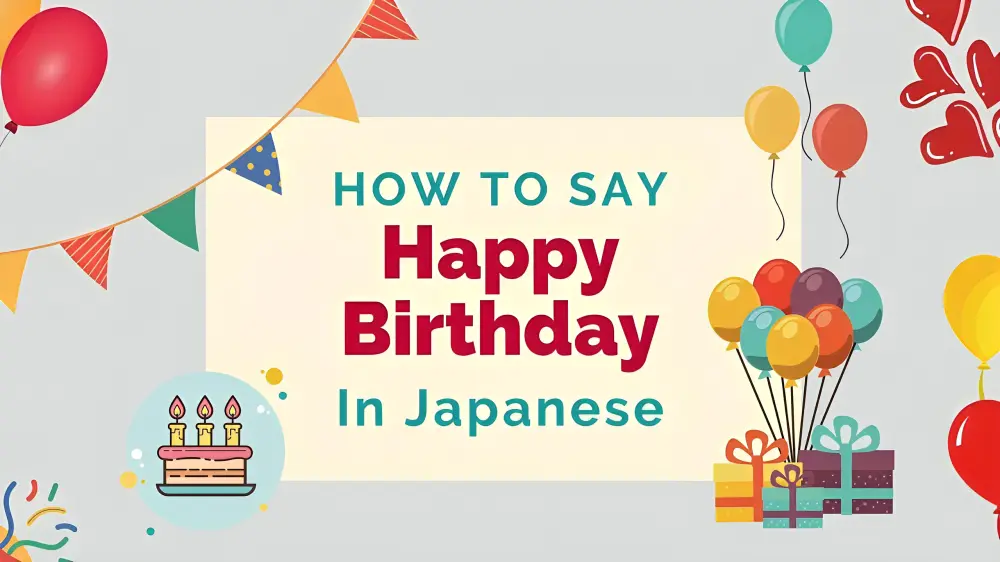So let’s explore together if you’re interested in learning How to Say Happy Birthday in Japanese and want to learn more about the rich tapestry of Japanese culture. Birthday celebrations are a worldwide source of happiness, a time to honor life’s achievements and offer thanks for another year of living. Many cultures celebrate this day in different ways all across the world, each with its rituals and traditions. Sending birthday greetings in Japan involves more than simply using the right words; it also shows a deep regard for cultural quirks and manners.
How to Say Happy Birthday in Japanese
Otanjoubi omedetou — Happy birthday (casual)
This is the most often-used, universal greeting for “happy birthday” in Japanese.
Save yourself a few syllables and omit the “o” in otanjoubi or gozaimasu if you’re a close friend or family member of the person turning a year older. This expression suggests a more relaxed, intimate tone between the speaker and the audience.
Otanjoubi omedetou. Paatii o tanoshimi kudasai. — Happy birthday. Enjoy your party.
Japanese: お誕生日おめでとう。パーティーをお楽しみください。
(おたんじょうびおめでとう。ぱーてぃーおたのしみください。)
〇〇-sai no otanjoubi omedetou — Happy Xth birthday
Is anyone commemorating a significant year? Or perhaps you would like to wish someone a more particular birthday. Use this phrase, which lets you enter the precise age that someone is turning, in that scenario.
You utilize the cardinal readings of Japanese numbers (issai, nisai, sansai, otanjoubi), even though you’re counting in ordinal numbers (first, second, third, etc.) for these birthday counts.
Jyuu hassai no o tanjoubi omedetou. Mou otona desu! — Happy 18th birthday. You’re an adult now!
Japanese: 18歳のお誕生日おめでとう。もう大人です!
(じゅうはっさいのおたんじょうびおめでとう。もうおとなです!)
Happii baasudee — Happy birthday
This should not come as a huge surprise, as loanwords are rather widespread in Japanese! Even more, options exist for you to say “happii otanjoubi.”
Naturally, singing the happy birthday song in Japanese might not be as difficult as you might imagine!
Happii Baasudee tu yuu! — Happy birthday to you!
Japanese: ハッピーバースデー トゥーユー!
(はっぴーばーすでーとぅーゆー!)
Otanjoubi omedetou gozaimasu — Happy birthday (formal)
The most elegant approach to wishing someone a happy birthday is with this sentence. This is an example of Keigo, or polite discourse (㕬語㼈けいご)), which is essential to speaking Japanese. If you want to treat the person with respect or if you don’t know them well, this is a decent choice.
Yamada-san, otanjoubi omedetou gosaimasu. Korekara mo Genki de ite kudasai. — Happy birthday, Mr. Yamada. Please continue to stay healthy.
Japanese: 山田さん、お誕生日おめでとうございます。これからも元気でいてください。
(やまださん、おたんじょうびおめでとうございます。これからもげんきでいてください。)
Must-know Birthday Vocabulary in Japanese
Tanjoubi Keeki — Birthday cake
Japanese: 誕生日ケーキ (たんじょうびけーき)
Tanjoubi — Birthday
Japanese: 誕生日 (たんじょうび)
Yatta! — Yay!
Japanese: やった!
Kanpai! — Toasts!
Japanese: 乾杯! (かんぱい!)
Nansai desu ka? — How old are you?
Japanese: 何歳ですか? (なんさいですか?)
Mada wakai desu ne or Heewaka sou desu ne — You look young for your age!
Japanese: まだ若いですね。(まだわかいですね。)or へー若そうですね。 (へーわかそうですね。)
Otanjoubi no yotei wa arimasu ka? — Do you have any plans for your birthday?
Japanese: お誕生日予定はありますか?(おたんじょうびのよていはありますか?
Omedetou gozaimasu — Congratulations
Japanese: おめでとうございます。
Tsumawanai mono desu ga — Just a little something for you
Japanese: つまらないものですが
Haaai! 〇〇-san no tameno puresento desu! — Here you go! A present for 〇〇-san!
Japanese: は〜い!〇〇さんのためのプレゼントです!(は〜い!〇〇さんのためのぷれぜんとです!)
Otanjoubi no negai ga kanaimasu youni — Here’s to your birthday wishes coming true!
Japanese: お誕生日の願いが叶いますように!(おたんじょうびのねがいがかないますように!)
Sutekina tanjoubi o sugoshite kudasai — Have a great birthday!
Japanese: 素敵なお誕生日を過ごしてください!(すてきなたんじょうびをすごしてください!)
The importance of birthdays in Japanese culture
Did you know that birthdays were not a huge event in Japanese culture traditionally? On New Year’s Day, the majority of Japanese people celebrate their birthdays together. However, individual birthdays are increasingly acknowledged and celebrated as a result of cultural changes brought about by Western influence. There are other significant anniversaries at three, five, and seven years old.
Conclusion
In addition to being a simple greeting, “Happy Birthday” in Japanese conveys a profound regard for customs and cultural decorum. Knowing these expressions will improve your communication and broaden your knowledge of this intriguing civilization, regardless of whether you’re studying Japanese for the first time or have spent a lot of time immersed in Japanese culture. Therefore, the next time you attend a Japanese birthday party, don’t be afraid to confidently and sincerely express your sincere wishes. Gozaimasu Otanjoubi Omedetou!

